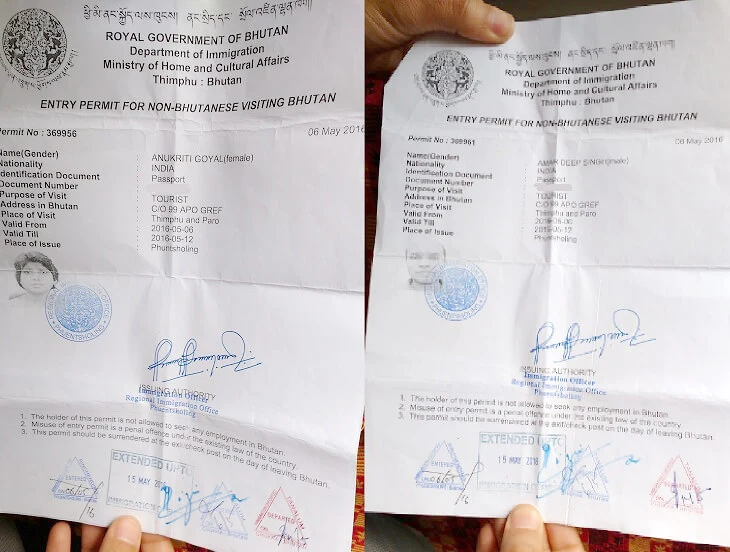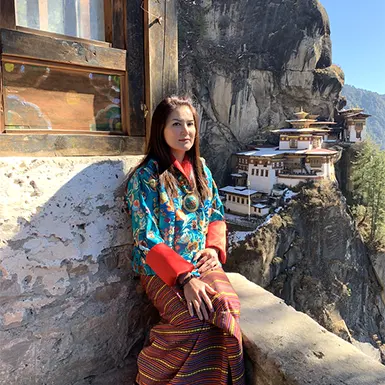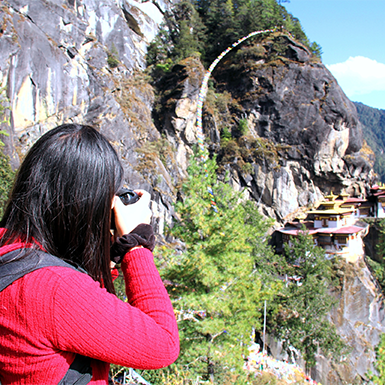Bhutan Revises Tourism Tax and Policies
- Friday July 1, 2022
- 0
As it is currently a hot subject, the government of Bhutan has somewhat altered its tourism strategy. Bhutan Revises Tourism Tax and Policies to uplift the economic standard of Bhutanese. It is a popular tourist destination, and its stunning scenery is more remarkable than its deeply ingrained religious culture. Every year, numerous visitors visit Bhutan to enjoy the country’s serene way of life, pleasant climate, beautiful scenery, mountains, and other natural features. In a similar vein, the Bhutan government is currently proposing a somewhat distorted perspective on the tourist industry. This plan allegedly came into being to improve the way of life and provide more positive results for Bhutanese individuals working in the tourism industry.
A Comprehensive Look at the Government’s Proposed Tourism Policy
A trip to Bhutan will provide a remarkable experience and a tremendous sense of the highlands and the Himalayas. Like everywhere, a Minimum Daily Package Fee (MDPR) applies for a single day and has a rate of USD 200 per person. And the revenue reflects the variety of services, including transportation, food, and lodging. But the fact is that in addition to the $200, there will also be a USD 65 Sustainable Development Fee (SDF), popularly known as the tourism tax.
The primary problem for tourists is that they will have to pay up to USD 200 for only SDF, which is a significant increase in the tourism tax. This SDF regulation could be unusual for travelers as they must pay the SDF as soon as they register their accommodations with the tour operator. Due to the straight increase in SDF costs, these policies may not be advantageous to the tourists.
Costs overall under the proposed strategy
This new policy affects a wide range of fields. Likewise, prices vary depending on who you are, whether you’re a couple, a solitary traveler, or part of a group. The couples must pay about USD 350 per day per person, while the groups must pay about USD 300 to 350 per day per person. Similarly, solitary travelers must pay between $400 and $450 daily. The package includes meals, hotel, transportation, and guides. These expenses include SDF, which is significantly more expensive than the prior policy.
Similarly, Prices may vary since the abovementioned prices are approximated rather than accurate. Additionally, there will be several websites for reserving hotels and inns. Without the aid of tour guides or packages, you may also travel alone across Bhutan. But the fact is that occasionally it could cost more than usual. Thus it’s best to go with tour guides.
Moreover, these travel and tour operators will fully uphold your responsibility. You will find every facility in Bhutan, from transportation to guides. Similarly, accommodations or food won’t be a problem traveling to Bhutan with these tour companies.
Discount on SDF
Not all guests may be able to get the SDF discount. Typically, this policy benefits those working in Bhutan’s tourism industry. Additionally, a discount is available for youngsters aged 6 to 12; a day will cost around USD 100. The same applies to children under five who are exempt from SDF. Since there would offer no discounts to other tourists or citizens, the SDF will effectively be a must for everyone and students, but prices may vary according to the nation.
How will the new policy impact regional tourism
In the past, there have been no restrictions on regional tourists from Bangladesh, India, and the Maldives driving independently. However, according to this new regulation, after obtaining a trip authorization, only may you plan your transportation. The management of transportation will also be under the control of tour operators.
The same applies to this Regional Tourism’s ability to access several services without travel advisors or tour operators. But they also have to pay SDF, which is far less than what other nationals must pay. For tourists from Maldives, India, and Bangladesh, it will cost USD 15 per person per day. According to the new regulation, regional tourists will not require tour companies to process their travel permits. Moreover, SDF will be the same for everyone who represents the neighboring countries.
Bhutan Revises Tourism Tax and Policies – The Rationale
The Bhutanese tourist industry may have previously been unjustified. Similarly, the prior tourist policy did not please policymakers. They developed this strategy because they wish to raise the standard of life and income of those working in the tourist industry. In a similar vein, the sector’s revenue fell short of expectations. Likewise, the disappointment led to a tax rise on this industry and higher prices in the tourism industry. Even while it could be a beneficial move, it might also have an impact on Bhutan’s tourism industry.
According to the theory put out by policymakers, creating this new regulation will increase tourism. However, the previous Tourism operator “Pelden Dorji” opposes the measures and asserts that the new policy would harm the tourism sector. The issue with tour operators providing packages at meager prices—something that is not typical—arose similarly. The concept is therefore implemented with the assumption that visitors will spend more money in these industries given the excellent amenities and premium services.
Presumption about the repercussions of the new policy
Making the tourism industry fantastic with this sort of policy is unusual. The SDF per night for tourists will be approximately USD 200, suggesting that the tourists would spend more and more on opulent products. However, with higher taxes in these industries, hotels, lodges, and even the tourism sector may see a decline in clientele. Although it is difficult to convince visitors to spend money on luxuries, it is still possible to draw in a small number of travelers who genuinely want to spend more than SDF each day.
The problem is that this measure has already been authorized by National Policy and is already being implemented.
Additionally, it is anticipated that with this legislation, the state’s overall revenue may decline. With the creation of this legislation, the travel agencies, hotel owners, and even the transportation industry may suffer losses. The policy may change once more, or it may just be a new tax system that has to be increased. The companies themselves might face serious difficulties. It will be considerably more challenging to function in this industry than earlier if the visitors are unwilling to spend the money as mentioned.
Similarly, if such a strategy increases tourist traffic, it may have been a prudent choice on the part of the policy maker. But the reality is that staying one night for less than USD 200 SDF can cause travelers to reconsider their decision to travel to Bhutan. Therefore, if this policy reverses, there will be a problematic scenario in the tourist business. Similarly, that will affect practically all the organizations involved in this industry, according to the analyst’s and professionals’ assumptions and projections. However, this aspect also has a positive effect, meaning that if the number of visitors rises appropriately, Bhutan’s tourism business will expand amazingly, making all aspects of tourism wonderful and more alluring.
Tourism Levy Bill
The purpose of the Tourism Levy Bill was to turn Bhutan into an elevated tourist destination. The policy makers’ projected decision reflects the SDF increase to USD 200 in the Tourism Levy Bill of Bhutan. This choice may attract a significant positive impact and result in additional investment in Bhutan’s tourist industry. The bill may have several drawbacks, but there is a manner that this industry might make an extensive range of earnings with the execution of this regulation.
This implies that if the decisions unfold as expected by the decision-makers, the decision might be the best one and signal a new era for Bhutan’s travel and tourism sector. Not only will this bill revolutionize Bhutan’s tourist sector, but it will also make it simpler for locals to obtain their daily bread. But the controversial tourist charge bill unveiled a new kind of strategy for Bhutan’s travel and tourism sector. This measure was enacted because Bhutan is a stunning nation and more tourists mean more money for the local economy. The tourist rate before the epidemic and after the outbreak will change significantly under this bill.

Lyonchhen’s Perspective on Tourism Levy Bill
On the television, Lyonchhen’s “Dr. Lotay Tshering” explains the benefits of this bill. Lyonchhen similarly states professionally that this regulation will benefit everyone who has difficulty supporting them via the tourism industry. Similarly, he desires to make a professional move on the part of the neighborhood travel and tourist businesses. The purpose of this study, which has significantly influenced Bhutan’s tourism history, is to encourage visitors to spend more money to improve the industry.
Furthermore, he stated that the government provides the Tourism Council of Bhutan full support to help the country’s tourism sector grow abroad. The new policy will replace the USD 65 for the SDF with USD 200. In addition to SDF, there will be growth in other tourism-related industries in the coming days. Lyonchhen demonstrates that the regional tourism sector will be highly profitable. This regulation will be extremely beneficial to both drivers and passengers. According to Lyochen, one of Bhutan’s greatest treasures is its tourist industry, and this strategy will help it operate in a very organized manner.
Advancement in Tourism Sectors
Similarly, Lyochen emphasizes that updating the facilities and rules would enhance every industry, from groceries to food, hotels to teahouses. Similar to this, he discusses the idea of cutting out the middleman and linking tour companies and travel agencies directly with tourists. Additionally, he notes that it will continue for three years and that if it doesn’t work as expected, it will be reformulated.
The Bhutanese tourist sector will undergo many additional changes due to the 2022 tourism tax, altering everyone’s way of life. Similarly, the adoption of this strategy would not only provide financial gain to individuals involved in this industry and improve everyone’s quality of life in Bhutan. The bill, in the opinion of the Lyochen, won’t impact the nation, but it will improve the flow of tourists. The opportunity to improve services and facilities across all tourism sectors will also increase with the expansion of SDF.
Positive Impact on Tourism Industry of Bhutan
Using the example and methodology of worldwide tourism level, Lyonchhen Dr. Lotay Tshering also discusses the research he had just done. He concludes that this action is somehow crucial for the country’s benefit. The potential adoption of SDF broadens the range of alternatives available to travelers, allowing them to select superior options for services ranging from luxurious to mediocre in quality.
This approach will function much better if there is an immediate increase in tourists visiting the area. According to Lyonchen’s opinions on this legislation, the change will promote understanding between foreign visitors and the Bhutanese population. With this strategy, the people of Bhutan will receive extraordinary and excellent benefits. Dr. Lotay Tshering further claims that some adjustments have been made to the SDF concerning local tourists.
The problem is that they must additionally pay at least USD 15, which is a pretty acceptable amount for travelers from the nearby nations. Similarly, proprietors of hotels and lodges will reap excellent benefits. The SDF charge may change in some way, but it may still maintain it in a highly professional manner. Lyonchhen notes that this strategy is to proceed with the proper study and research. Likewise, it is based on the people of Bhutan and the government of Bhutan.
This policy has to be developed to see the tourist sector grow significantly. Similarly, visitors to Bhutan’s lodges and teahouses spend far less than customary, contributing to the country’s uncertain economic situation in the tourism industry. Everyone involved in the Bhutanese tourist industry, from drivers and guides to tour guides and hotel owners, would be happy with this approach if they could afford adequate remuneration.







